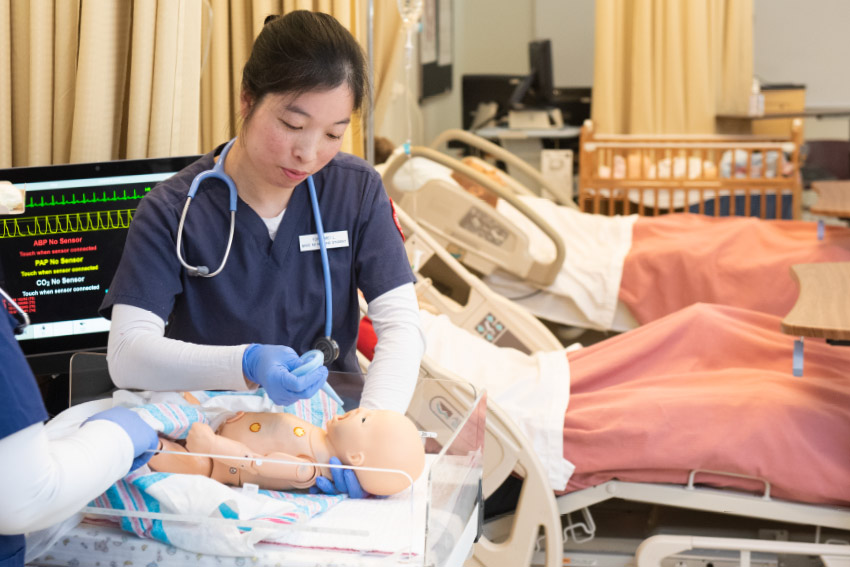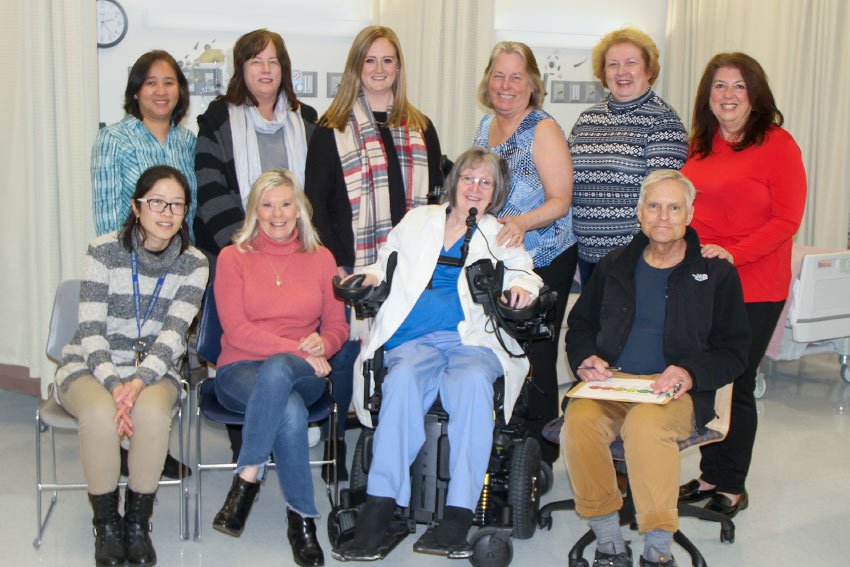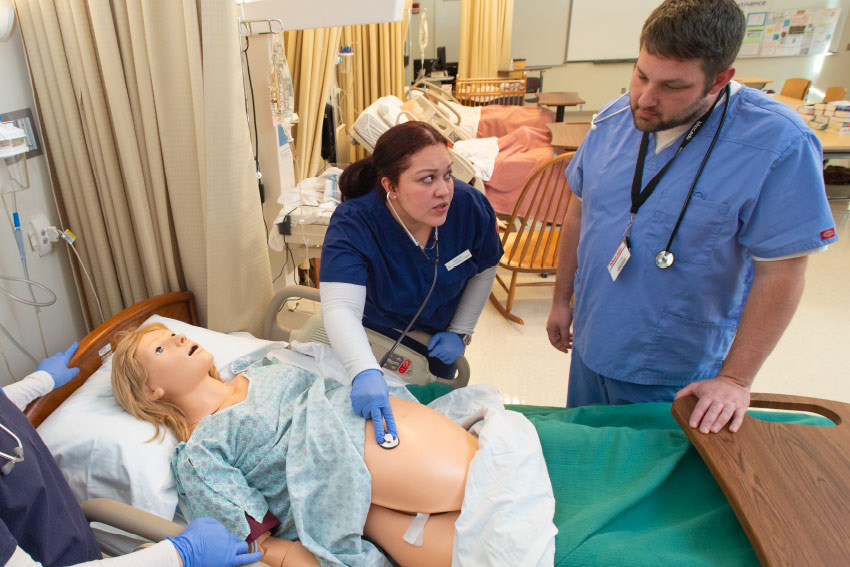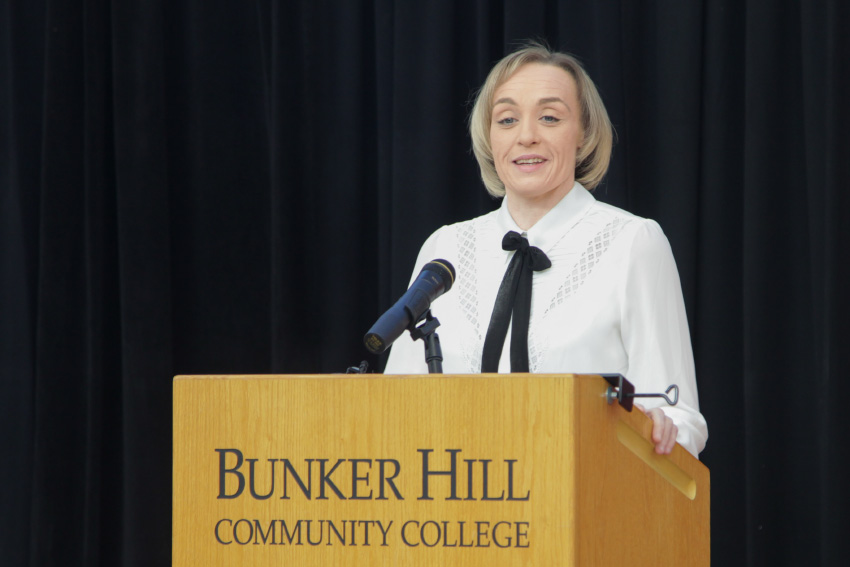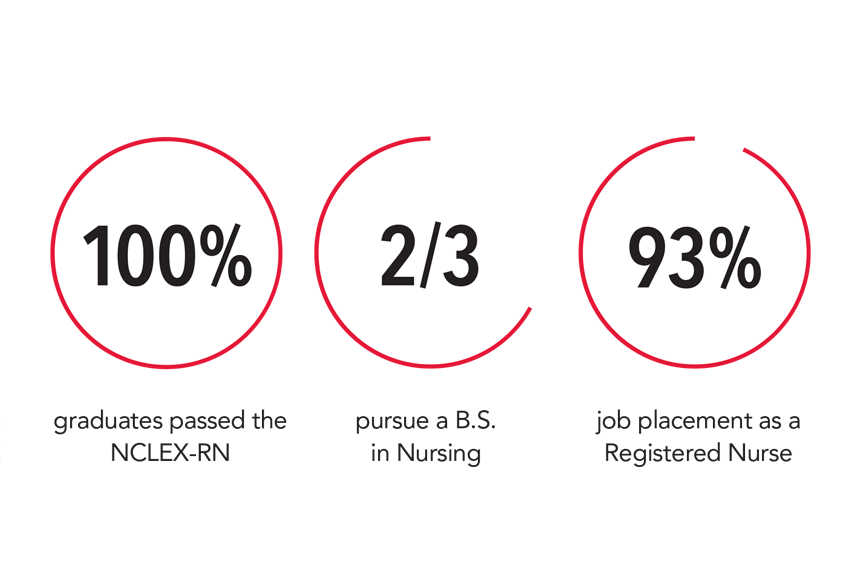Nursing faculty revive pulse of BHCC Nurse Education Program
Friday, May 8, 2020
Moving full speed ahead, the Bunker Hill Community College Registered Nursing Program is celebrating a new milestone: 100 percent of its 2019 graduates passed the National Council Licensure Examination for Registered Nursing (NCLEX-RN).The perfect licensure rate is a big achievement for a program that had been in danger of losing its accreditation from the Accreditation Commission for Education in Nursing (ACEN) and losing approval from the Board of Registration in Nursing (BORN). It directly reflects the collaborative efforts of leadership and faculty: in 2016 they put the brakes on the program and with renewed energy and steadfast commitment built a high-quality curriculum that better equips graduates to meet the growing demands of the nursing field.
The Nursing Program transformation was led by Director of the Nurse Education Department Elizabeth Tobin, Assistant Dean of Health Sciences Donna Savino and Chairperson Kristen Wenger, under the stewardship of the Dean of Health Sciences Maryanne Atkinson and interim Dean of Health Sciences Laurie McCorry, Ph.D. They revised the curriculum by streamlining syllabi and outlining unified course objectives and outcomes to ensure students receive the same level of instruction and experience across faculty and sections. “Consistency was key to our success,” said Tobin.
Savino attributes much of the program’s achievement to faculty and staff who were willing and ready to put in the extra time and effort to improve it, working extra hours over the course of a year to rebuild from the bottom up. “Part of this process required aligning faculty so we could capitalize on our strengths to improve overall student learning,” she said. “We needed to identify our champions in these areas, so that we could move forward.”
The Nursing Program revamp was made possible by the investment and support of College administration, including BHCC President Pam Eddinger and James F. Canniff, Ed.D., Provost and Vice President, Academic and Student Affairs; they provided the resources for rebuilding and guided Tobin and Savino every step of the way.
“President Eddinger and Dr. Canniff never expected this program would be turned around in as short of a time as it was,” said Savino. “But Dr. Canniff knocked down barriers for the program, and he guaranteed us the funding we needed. Our success is truly a reflection of the administration and their investment in the program.”
In 2019, BHCC’s nursing program secured its accreditation from ACEN and approval from BORN. “BHCC’s nursing program is not alone – a number of nursing programs in the region are currently making improvements to secure accreditation,” said Canniff. “To take a program with a low passing rate and achieve 100% passing rate in a short period of time is remarkable, and I hope that our program can serve as a guide for others who wish to transform their program.”
The program looks very different than it did before the revamp. Today, program curriculum is mapped to the NCLEX-RN detailed test plan as well to program concepts. The curriculum undergoes continuous review and evaluation by faculty and staff, who use a technology-based assessment tool to follow patterns in student learning outcomes.
“Each semester, faculty look for trends in how students are performing on the classroom exams as well as their standardized exams,” explained Tobin. “Faculty report back to us on what they are seeing and what areas need more attention. The graduate who leaves us now feels more confident in their skills and is better prepared to be active in
the workplace.”
Out of the curriculum revision grew a series of initiatives that achieved immediate results for graduating students. One such initiative is the NCLEX Student Success program, which provides support to students following graduation as they prepare for examination. Faculty work in small groups with students for an eight-week period, a timeline based on the premise that the best strategy for success is to take the NCLEX-RN within 60 days of completing coursework. After the eight weeks, faculty check in with their assigned graduates on a weekly basis.
Another initiative is a three-day live review to help students prepare for a virtual review typically taken before taking the NCLEX-RN. Prior graduates were not always completing their virtual review before taking the exam. Now there is time built into the final semester for students to work on their virtual review on campus where faculty are available to them as a resource.
“Previously, there was no one to intervene with students,” said Tobin. “By having students work on their review in the College’s computer suite, their teachers can be in the room helping to guide them and answer questions.”
The goal is to have students complete 50 percent of their virtual review before graduation. The remaining 50 percent is done on their own with the support of faculty. “Faculty are constantly refocusing and retesting,” said Tobin. “The faculty not only address problems with students, they’re their cheerleaders who push them through the virtual review and encourage them to wait to get the ‘green light’ to take the exam.”
As students work through their virtual review, they are retested on their knowledge, and as they pass each section, they move further along toward the “green light,” the point at which they’ve demonstrated they are prepared to take the NCLEX-RN.
Through the support of College administration and a grant awarded by Pearson Education, the Nursing Program has been able to offer $200 vouchers to students who get the “green light.” This incentive has helped to decrease the timeframe in which students complete the virtual review, increasing their likelihood of passing the NCLEX-RN.
Changes to how students complete their required clinical practice have also enhanced the Nursing Program. In 2018, the College moved maternity and pediatric clinical practice to a state-of-the-art simulation lab on the Charlestown Campus, hiring instructional technologist Andrew Camerato to maintain and network the lab’s simulation manikins and equipment. The change also had the benefit of giving faculty more time to focus on their teaching.
Faculty also saw the need for more medical-surgical clinical practice, so students now experience it in every semester. “We wanted to produce a graduate who felt confident not only academically, but also confident in the clinical setting,” said Tobin.
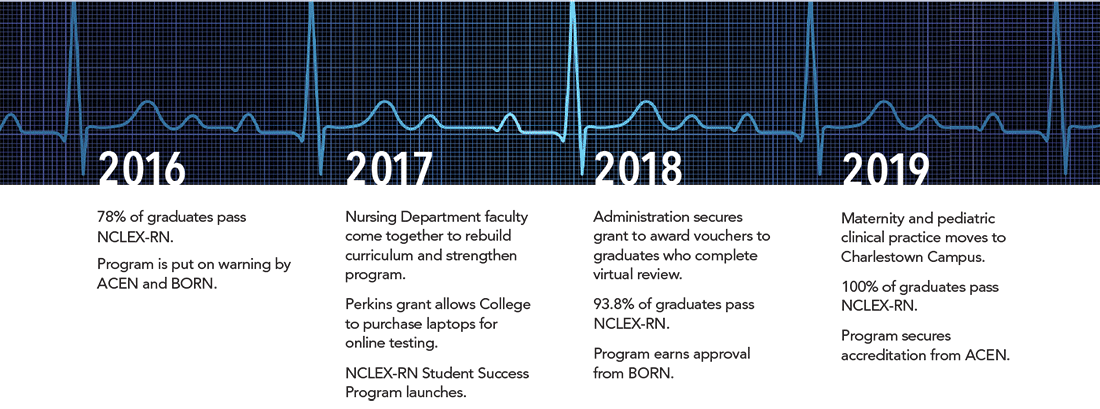
More improvements were made by establishing boot camps and more use of online resources. Boot camps held the week before the semester starts offer time for students to brush up on how to use online products, study skills and drug calculation. A Perkins grant enabled the College to purchase laptops for nursing students to take all exams online. Training was offered for students to understand the new testing process and allowed students to gain familiarity with a format that simulates the NCLEX Exam. This all contributed to the success of the program and increase in pass rates.
Together, these wide-ranging improvements led to the remarkable feat of every graduate passing their NCLEX-RN last year. “Our program was in trouble, and we had to rebuild,” Tobin summed up. “As we rebuilt, we started these initiatives and we found that with each one, our students were getting stronger and stronger.”
Journey to Practitioner - Meet graduate Joanne Smith
At the December 2019 Registered Nurse Pinning Ceremony, class speaker and fellow graduate Joanne Smith compared the experience of attending nursing school to riding on a rollercoaster without a seatbelt that’s been set on fire. “There are an infinite number of correct ways for you to get off the rollercoaster,” she said. “However, in order to exit, you must know which one is most correct.”
In nursing, students learn quickly there are always two answers – but one is the better answer. “It’s a place where you spend hours upon hours studying often to be met with the most ambiguous of test questions,” said Smith. She went on to say her experience at the College inspired her to become more than she possibly thought she could be and to be unhindered by failure.
At the ceremony Smith thanked the Nursing department faculty and staff for their dedication to the program. “Thank you for being available every time that we needed you,” said Smith. “The passion with which you shared your knowledge is contagious and inspiring. There are no words that can truly express our gratitude for your patience and passion and unwavering support these past two years.”


